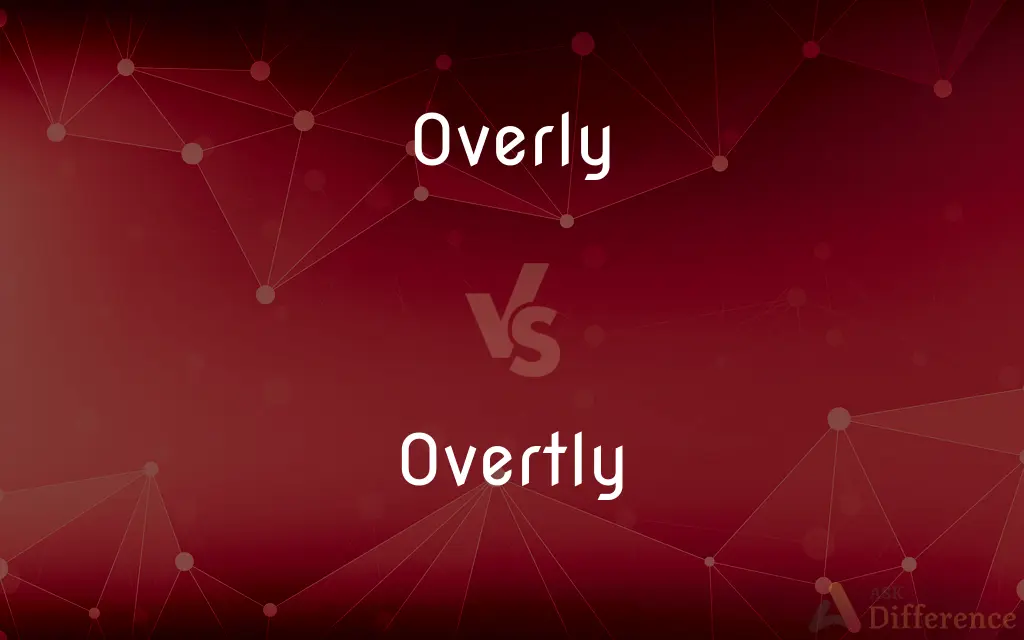Overly vs. Overtly — What's the Difference?
By Fiza Rafique & Maham Liaqat — Updated on April 8, 2024
Overly means excessively or to a greater extent than is desirable, while overtly implies something done openly, without concealment.

Difference Between Overly and Overtly
Table of Contents
ADVERTISEMENT
Key Differences
Overly is used to describe an action or quality that goes beyond what is considered reasonable, necessary, or appropriate. It often carries a negative connotation, suggesting that something is done to an excessive degree, leading to undesirable outcomes. For example, being overly cautious might prevent someone from taking reasonable risks. Overtly, in contrast, refers to actions or behaviors that are done in an open and unhidden manner. It is about the visibility and openness of actions or attitudes, rather than their intensity or degree.
When describing emotions or actions, "overly" is often used to suggest that there is an excess that could be counterproductive. For instance, being overly anxious about an upcoming event might hinder one’s ability to enjoy it or prepare effectively. On the other hand, "overtly" relates more to the manner in which something is expressed or done, indicating transparency or lack of concealment, such as someone being overtly critical in a meeting.
In the context of feedback or criticism, being overly critical can imply that the criticism is harsher or more negative than might be helpful or constructive. Conversely, if the criticism is overtly expressed, it means that it is done openly, without trying to hide or sugarcoat the feedback, regardless of its intensity or harshness.
"Overly" is often paired with adjectives or adverbs to modify the extent of a characteristic or action, suggesting that lessening the intensity could be more beneficial. For instance, an overly ambitious project might fail due to unrealistic goals. "Overtly," however, modifies how actions, attitudes, or beliefs are displayed to others, emphasizing the lack of secrecy or subtlety, such as overtly displaying political affiliations.
The distinction also extends to perception and reception. Overly behaviors or traits are often perceived negatively because they exceed normal bounds or expectations, which can lead to adverse reactions from others. Overtly, however, focuses on the method of expression, where the reaction of others may hinge more on the content or subject of what is being openly expressed, rather than the manner of its expression being too much.
ADVERTISEMENT
Comparison Chart
Definition
Excessively, beyond a desirable extent
Openly, without concealment
Connotation
Negative, implying too much
Neutral, implying transparency
Application
Describes the degree of intensity
Describes the manner of expression
Examples
Overly anxious, overly ambitious
Overtly critical, overtly supportive
Perception
Perceived negatively due to excess
Perceived based on the openness of expression
Compare with Definitions
Overly
Exceeding reasonable limits.
He was overly optimistic about the project's timeline.
Overtly
Implies no secrecy.
He overtly displayed his credentials to prove his expertise.
Overly
Implies a need for moderation.
The plan was overly complicated, requiring simplification.
Overtly
Can be related to social or political stances.
The group was overtly activist in its goals.
Overly
Often pairs with emotional states.
They were overly excited, leading to disappointment.
Overtly
Done in an open manner.
The company overtly supports environmental initiatives.
Overly
Suggests negative repercussions.
Being overly critical can damage one's self-esteem.
Overtly
Encourages transparency.
Overtly sharing information fostered trust within the team.
Overly
Leading to undesirable outcomes.
Her overly cautious nature sometimes held her back.
Overtly
Involves clear, visible actions.
She was overtly opposed to the new policy.
Overly
To an excessive degree
Overly protective.
Overtly
Open and observable; not hidden, concealed, or secret
Overt hostility.
Overt intelligence gathering.
Overly
To an excessive degree.
Parents can be overly protective of their children.
Overtly
Of, relating to, or being military or intelligence operations sanctioned or mandated by Congress
Overt aid to the rebels.
Overly
(obsolete) Superficially.
Overtly
In an overt manner; publicly; openly.
Overly
(obsolete) Carelessly, without due attention.
Overtly
Publicly; openly.
Overly
(obsolete) With a sense of superiority, haughtily.
Overtly
In an overt manner;
He did it overtly
Overly
(obsolete) Superficial; not thorough; careless, negligent, inattentive.
Overly
(obsolete) Having a sense of superiority, haughty.
Overly
(obsolete) Excessive; too great.
Overly
Careless; negligent; inattentive; superfical; not thorough.
Overly
Excessive; too much.
Overly
In an overly manner.
Overly
Excessively.
Overly
To an excessive degree;
Too big
Common Curiosities
How can a policy be overtly discriminatory?
A policy is overtly discriminatory if it openly imposes unfair treatment on certain groups without attempting to hide its bias.
Is it better to be overtly or overly ambitious?
Ambition is generally positive, but being overly ambitious can suggest unrealistic goals that may lead to failure or burnout. Overtly ambitious would imply being open about one's ambitions, which is neutral and dependent on context.
What's the difference between being overtly friendly and overly friendly?
Being overtly friendly involves openly showing friendliness in a transparent manner, whereas being overly friendly might imply an excessive degree of friendliness that could seem insincere or invasive.
What's the impact of overly cautious decision-making?
Overly cautious decision-making can lead to missed opportunities and may hinder growth or progress due to fear of taking risks.
What does it mean to be overly protective?
It means being excessively cautious or controlling in a way that may limit independence or growth.
Is being overly emotional a negative trait?
While expressing emotions is natural, being overly emotional can be perceived negatively if it leads to excessive reactions that affect one's well-being or social interactions.
Can someone be overtly humble?
Yes, someone can be overtly humble if they frequently and openly exhibit humility, possibly to the point where it is a prominent aspect of their persona.
Can a statement be overtly positive?
Yes, a statement can be overtly positive if it is expressed in a clear, open, and unambiguous manner.
How does one correct overly aggressive behavior?
Correcting overly aggressive behavior often involves understanding the underlying causes, seeking to moderate responses, and developing healthier ways to express emotions or handle conflicts.
What distinguishes overly protective parenting from overtly protective?
Overly protective parenting involves excessive control or sheltering that can limit a child’s independence, while overtly protective parenting would be more about openly displaying protective behaviors, regardless of the degree.
What are the consequences of overtly expressing opinions in a professional setting?
Overtly expressing opinions in a professional setting can foster transparency and open dialogue but may also lead to conflicts if not done respectfully or considerately.
Can being overly detailed be a problem?
Being overly detailed can be problematic if it leads to information overload, confusion, or delays in decision-making due to an excessive focus on minutiae.
Is it possible to be overly optimistic?
Yes, being overly optimistic can lead to unrealistic expectations, underestimating challenges, and potential disappointments.
How does society view overtly competitive individuals?
Society's view on overtly competitive individuals can vary; while competitiveness can be admired, being overly competitive or overtly so in all situations might be seen as aggressive or off-putting.
Why might someone choose to be overtly political?
Someone might choose to be overtly political to clearly communicate their beliefs, influence others, or advocate for change openly.
Share Your Discovery

Previous Comparison
Surprise vs. Unexpected
Next Comparison
Hereafter vs. HereinafterAuthor Spotlight
Written by
Fiza RafiqueFiza Rafique is a skilled content writer at AskDifference.com, where she meticulously refines and enhances written pieces. Drawing from her vast editorial expertise, Fiza ensures clarity, accuracy, and precision in every article. Passionate about language, she continually seeks to elevate the quality of content for readers worldwide.
Co-written by
Maham Liaqat












































